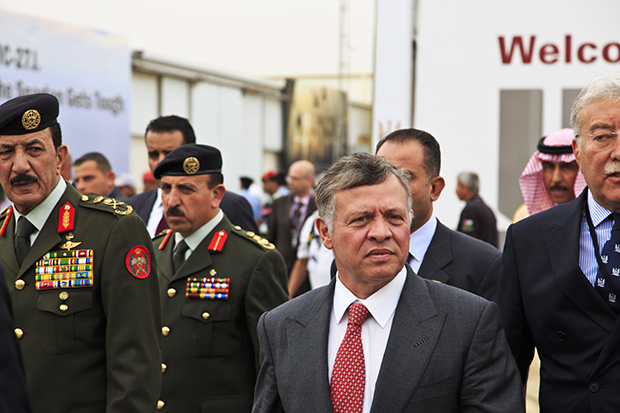1 Sep 2015 | mobile, News and features, Turkey, United Kingdom
The anti-terror charges against reporters for Vice News in Turkey are not isolated. In recent years, a number of countries have used broad anti-terror laws to restrict the freedom of the press.
Turkey
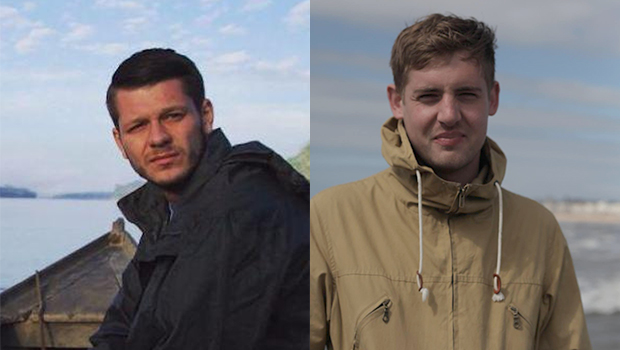
British journalists Jake Hanrahan, left, and Philip Pendlebury and Iraqi translator and journalist Mohammed Ismael Rasool were filming clashes between pro-Kurdish youths and security forces, according to Vice. (Photos: Vice News)
Two British journalists and a local fixer working for Vice News were charged on Monday 31 August in Turkey with “working on behalf of a terrorist organisation”. They will remain in detention until their trial, the date of which has not yet been announced.
The journalists Jake Hanrahan, Philip Pendlebury and Iraqi translator and journalist Mohammed Ismael Rasool were filming clashes between security forces and youth members of the Kurdistan Workers’ Party (PKK) in the south-eastern city of Diyarbakir on Thursday when they were arrested.
Turkey’s broad definition of terrorism means that any journalist reporting on PKK activities or Kurdish rights can be charged with the offence of making “terrorist propaganda” and jailed.
Index on Censorship Chief Executive Jodie Ginsberg said: “Coming just days after the unjust sentencing of three Al Jazeera journalists in Egypt, these latest detentions of journalists simply for doing their jobs underlines the way in which governments everywhere can use terror legislation to prevent the media from operating.”
Egypt
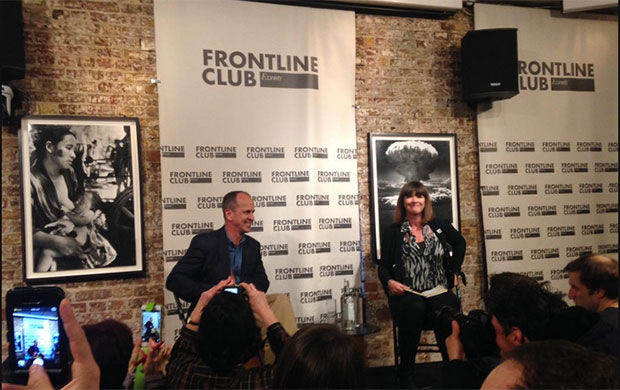
Peter Greste spoke to a Frontline Club audience about his arrest and detention in Egypt. (Photo: Milana Knezevic / Index on Censorship)
Egypt remains a cause for concern when it comes to press freedom: on 29 August 2015 Al Jazeera journalists Mohamed Fahmy, Peter Greste and Baher Mohamed were sentenced to three years in prison. The journalists were found guilty of of “broadcasting false information” and “aiding a terrorist organisation” – a reference to the Muslim Brotherhood.
The sentencing came just weeks after President Abdel Fattah el-Sisi’s government passed an anti-terror law setting a fine of up to 500,000 Egyptian pounds (£41,600) for journalists who stray from government statements or spread “false” reports on attacks or security operations against armed fighters.
Jordan
Jordan introduced a new “anti-terror” law in 2006 prohibiting, among other things, the engagement in “acts that expose the kingdom to risk of hostile acts, disturb its relations with a foreign state, or expose Jordanians to acts of retaliation against them or their money”. The charge carries a prison sentence of three to 20 years. The law was amended in 2014 to , broaden the definition of terrorism.
Interpretation of the law has been varied. According to the Committee to Protect Journalists (CPJ), in April 2015 a journalist was jailed for criticising the Saudi-led bombing of Houthi forces in Yemen. Another journalist was detained in July 2015 for breaking a recent ban on coverage of a terror plot. Earlier in 2015, an activist who criticised the royal family’s support of Charlie Hebdo on Facebook was sentenced to five months in jail under the anti-terror law.
Tunisia
One month after June’s terrorist attack on Sousse beach killing 38 tourists, for which ISIS claimed responsibility, Tunisia approved new anti-terror legislation.
Under the legislation, website editor Nour Edine Mbarki was charged in connection with publishing a photograph of a car that purportedly transported a gunman behind the beach attack. According to the CPJ, he was charged under Article 18 of the law with “complicity in a terrorist attack and facilitating the escape of terrorists,” which carries a prison term of between five and 12 years. He is currently awaiting a trial date.
Human Rights Watch said the new anti-terror bill “would open the way to prosecuting political dissent as terrorism, give judges overly broad powers, and curtail lawyers’ ability to provide an effective defence”.
Pakistan
Rights groups have long criticised Pakistan’s notorious anti-blasphemy laws for their effect on freedom of expression in the country. But strengthened anti terror legislation is also impacting the way journalists operate in the country.
In June, three Pakistani journalists were charged under the Anti-Terrorism Act, reportedly for covering the activities of a dissident politician, according to the Pakistan Press Foundation. A year before, a TV anchor was also charged under the law.
One to watch: Kenya
Following two separate attacks by al-Shabab militants in December, Kenya’s President Uhuru Kenyatta signed into law a new security bill that could curtail press freedom. Under the new law, journalists could face up to three years in jail if their reports “undermine investigations or security operations relating to terrorism” – or even if they published images of “terror victims” without police permission.
This hasn’t come into play yet – in February, the Kenyan High Court threw out several clauses, including those that could impact media freedom. The government has said it would consider lodging an appeal.
This post was written by Emily Wight for Index on Censorship
This article was posted on 1 September 2015 at indexoncensorship.org
28 Aug 2015 | Mapping Media Freedom, mobile, News and features, Romania
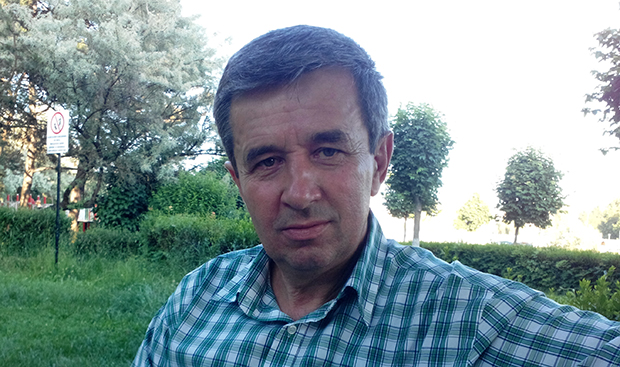
Vasile Luca (Photo: Zoltan Sipos)
Vasile Luca, a veteran journalist working at Radio Cluj, a Romanian public radio station based in Cluj-Napoca, was fired in May 2015 as a result of a disciplinary committee hearing.
Two months before his termination, Luca, who had been with the station for 25 years, went public with internal documents showing that a station employee, Debreczeni Hajnalka, who was also the press secretary for the head of a political party, was not actually completing any work despite an unusually high salary. Luca filed a complaint at the public prosecutor’s office and, after media coverage, Hajnalka resigned from the station. The station refused to disclose what Hajnalka’s job title had been.
At the time of the resignation, Hajnalka said her role had been to coordinate media strategies, internal communication between public stations and media monitoring. She denied that she had broken any laws or acted inappropriately.
“The case of Debreczeni Hajnalka was surely not the sole reason for my dismissal”, Luca told Index during an interview. “However, after the Debreczeni scandal, there was a lot of pressure, and multiple phone calls were made because the party she works for, the Democratic Union of Hungarians in Romania (DAHR), is very influential in the upper echelons of public radio”.
Luca had a long track record of conflicts with station management. He had previously documented illegalities and misuse of public funds at the radio station. In 2010, Luca was granted whistleblower status by Transparency International Romania after he gathered evidence that Florin Zaharescu, director of the station at the time, was embezzling funds.
Luca was subjected to his first disciplinary action in January 2015. Station management accused him of being the author of caricatures of the radio station’s directors. The images were found in the office he shared with six other journalists.
“When Ovidiu Miculescu, the general director of the Romanian Radio Broadcasting Company, was showing his solidarity with the murdered editors of Charlie Hebdo at the French Embassy, editor-in-chief at Radio Cluj, Bogdan Rosca, was trying to impose disciplinary actions against me for a couple of ironic quotes and some pictures of a bristly kitten”, the journalist said.
Along with the “bristly kitten”, the disciplinary committee also weighed a private letter the journalist had written to Vasile Dancu, a local politician and sociologist. In the letter, Luca criticised Dancu for supporting Rosca, his former student, calling him “incompetent”, “unprepared” and “resentful”.
The committee also considered a letter that Luca wrote to Miculescu that criticised Rosca’s managerial performance by citing research that showed that the radio station’s audience numbers plummeted after Rosca took over in February 2014.
As a result of the hearing, Luca’s salary was cut by 10 per cent for one month.
Immediately after the first disciplinary hearing, the editor-in-chief filed a complaint against Luca accusing him of collaborating with a privately-owned television station while he was on sick leave.
“My work ended well before I took a couple of months of sick leave. Even the disciplinary committee had to admit that I had management’s approval for a one-year collaboration with Argo TV which began in April 2013”, Luca said.
Months after the series of documentaries were shot and aired, the television station uploaded the documentary onto their website. The web publication date coincided with the period Luca was on leave. He also appeared on an Argo TV talk show during his leave.
“Luca had an appearance on television as an editor he could not account for”, Attila Szász, the head of the disciplinary committee told Index. “We did not recommend he be dismissed. The dismissal was the decision of the general director”.
According to Luca, the hearing of the disciplinary committee was unlawful because he was not granted the right to be represented by a lawyer. In a written request sent to the committee just before the hearing, Luca pointed out that the exact time and place of the hearing was not set and when they finally made the decision, his lawyer was unable to be present.
Luca said he did not receive copies of the medical records used as evidence against him and, he believes, that the process did not meet standards required by Romanian labour law. As a whistleblower, Luca said, there are legal requirements for transparency that were not met. For example, the time and location of the hearings were supposed to be publicised three days in advance and members of the press should have been granted access.
He has filed a legal complaint and a judge will decide whether he has grounds to challenge the disciplinary actions.
Mapping Media Freedom
Click on the bubbles to view reports or double-click to zoom in on specific regions. The full site can be accessed at https://mappingmediafreedom.org/
|
Related:
• Romania: Whistleblowing journalist fired by public radio station (28 May 2015)
• Romania: 52 reports since May 2014
This article was published at indexoncensorship.org on 28/8/2015
17 Jun 2015 | Events, Magazine, mobile
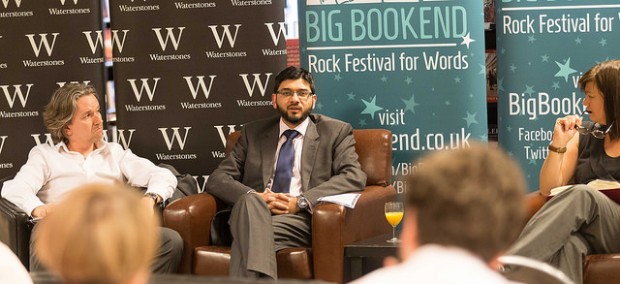
Index hosted a debate at the Leeds Big Bookend festival (Photo: Steve Evans)
Does freedom of religion and freedom of speech come as a package or can you pick and choose? Do those suggesting freedom of expression should be “civilised” and that we should be wary of causing offence to people’s religious sensibilities have a point? Or are there too many people who are easily offended? Are our attempts to be polite actually significant obstructions to the discussion of important issues? These were just some of the questions tackled at “The new civility: are religious freedom and freedom of speech intertwined?” the 10 June event organised as part of the Leeds Big Bookend festival.
Chaired by Index on Censorship magazine editor Rachael Jolley, the panel was made up of assistant features editor at the Yorkshire Evening post Chris Bond, local imam Qari Muhammad Asim MBE and author Anthony Clavane.
In the past, people who have argued for greater religious freedom have also fought for greater freedom of speech, but the debate looked to address the idea that this connection has become somewhat lost. It sprang from the Spring 2015 issue of Index on Censorship, where writers from across the world, including Elif Safak and Ariel Dorfman, provided thoughtful analysis of the aftermath of Charlie Hebdo killings.
The debate threw up some fascinating themes and the panel were observed and questioned by an enthusiastic audience at Waterstones, Leeds. A full recording of the event in the form of a podcast can be listened to below.
The new civility: are religious freedom and freedom of speech intertwined? by Tttdebates on Mixcloud
8 Jun 2015 | mobile, Youth Board
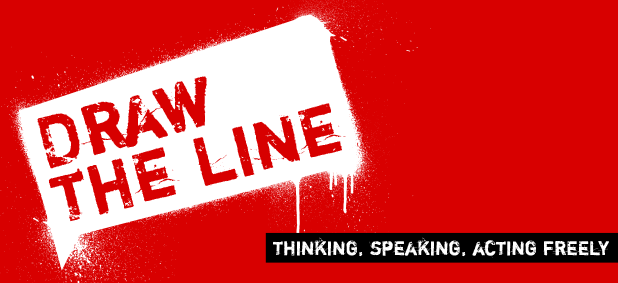
Over the past few months, the Index on Censorship Youth Advisory Board has been coming together to ask difficult, yet essential questions; attempting to spark and promote thought provoking debates and engage the general public in societal issues and conflicts that affect us all.
The topics we have explored in #IndexDrawTheLine can be found below. You can follow the links to see the youth board’s full coverage.
- Returning to the issue of extremism for our penultimate discussion, we looked at whether or not it has a place on campus, arguing that: “Universities should be places where young people have the freedom to learn, debate and use their knowledge to challenge guest speakers.”
But the conversation doesn’t stop there. We have to keep encouraging open debate and a level of transparency in a world full of censorship. It is imperative as new threats to free speech arise each day, and old threats recur. It is the responsibility of all of us to provide a voice for the voiceless, represented and unrepresented alike.
To join in future discussions, follow the #IndexDrawtheLine hashtag on Twitter.
This article was posted on 8 June 2015 at indexoncensorship.org


